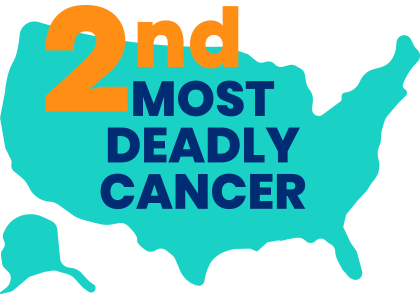Colorectal Cancer Information Center
Learn more about colorectal cancer and how ColoTest® can help detect early warning signs.
Facts About Colorectal Cancer

Colon Cancer is the 3rd most common cancer diagnosed in both men and women in the US, with an estimated 150,000 new cases diagnosed in 2023.7

Colon Cancer is the 2nd most deadly cancer in the US with an estimated 52,000 expected to lose their battle in 2023.8

About 90% of CRC related deaths are thought to have been preventable if diagnosed early enough. That’s 9 of every 10 individuals.9
Signs & Symptoms
Colon cancer sometimes remains hidden and does not cause symptoms right away. However, some symptoms to be aware of are:
- Blood in the stool, discoloring of the stool to dark red or black
- A change in bowel habits, such as diarrhea, constipation, or feeling as though you need to have a bowel movement without relief from one
- Rectal bleeding with bright red blood
- Cramping or abdominal pain
- Fatigue and feeling weak and run down
- Unplanned weight loss

Blood in the stool can be an initial sign of colorectal cancer. There may be obvious signs of bright red bleeding or darker-colored bowel movements. ColoTest® should not be used in these cases. See your doctor to discuss options. More commonly, bleeding may be present but not visible, and it is known as occult (hidden) blood, which various tests, including ColoTest® can discover.2,4
Risk and Cancer Development Factors
There is a 5% risk of someone with an average risk to develop colorectal cancer. Below are factors that may
increase the risk of developing colorectal cancer:1,2,3
- Age – The majority of colorectal cancer patients are over the age of 50
- Family History – It is crucial to speak to family members about past health history, as 5% to 6% of colorectal cancer cases are associated with an inherited genetic factor that increases the risk of cancer
- An Inactive Lifestyle
- Smoking
- Gender – Men have, on average, a slightly higher risk of developing colorectal cancer
- Inflammatory bowel disease
- Adenomatous Polyps
- Type two diabetes
- Food/Diet
Detection and Diagnosis
COLONOSCOPY
BIOPSY
BLOOD TESTS
Blood tests aren’t used to diagnose colon cancer but rather to give doctors and patients clues on overall health. There are indications that may point a medical professional in the direction of colon cancer or bleeding caused by the cancer. In addition, colon cancer sometimes produces a protein called carcinoembryonic antigen, or CEA. Blood tests can help to identify this protein, and track if cancer is responding to treatment or is returning.6
1 mayoclinic.org/diseases-conditions/colon-cancer/symptoms-causes/syc-20353669
2 cancer.org/
3 pfizer.com/disease-and-conditions/colon-cancer
4 hopkinsmedicine.org/health/conditions-and-diseases/colon-cancer/colon-cancer-symptoms
5 cancer.net/cancer-types/colorectal-cancer/risk-factors-and-prevention
6 mayoclinic.org/diseases-conditions/colon-cancer/diagnosis-treatment/drc-20353674
7 https://pubmed.ncbi.nlm.nih.gov/36856579/
8 https://www.cancer.org/cancer/types/colon-rectal-cancer/about/key-statistics.html
9 https://www.ucsfhealth.org/education/colorectal-cancer-prevention-and-screening
DISCLAIMER: The information provided here is not intended to replace the medical advice of your doctor or health care provider. Please consult your health care provider for advice about a specific medical condition. The information provided here is for educational purposes only. In no way should it be considered as offering medical advice. Reese Pharmaceutical Company assumes no responsibility for how this material is used. Please check with a physician if you suspect you are ill.





